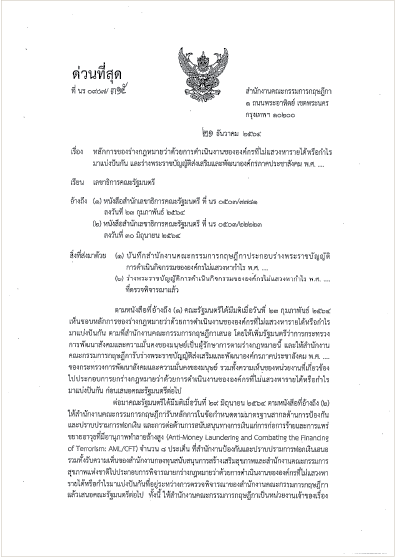
Thailand’s NGO Bill: boring name, big implications
Have you heard of the NGO Bill?
You might have heard the NGO Bill (Operation of Not-for-Profit Organizations Act) aims to create transparency in the nonprofit sector. Every industry needs regulation and oversight, but a closer look reveals that this bill does much more than that—and most of it isn’t good.
If passed as written, this bill will:
Take away our basic freedoms of speech, assembly and association.
Cripple the nonprofit sector, and make life harder for many Thai people who depend on NGOs to feed their families, access healthcare, and find work.
Drive out international investment and aid, and cut off a lifeline for activists in Southeast Asia fleeing brutal regimes.
Take away good paying jobs by making it harder for thousands of organizations to operate and employ Thai people.
Waste our tax money on redundant NGO audits, enforcement committees, and police resources.
A closer look at the bill
The first big problem with the bill is that the language is very vague. The subjective language means that almost any action could qualify as breaking the law. Below NGOs are asked to make sure they aren't tainting people’s “good morals” or “disturbing happiness”—or pay a daily fine of 10,000 baht.
Section 20: A Not-for-Profit Organization must not operate in the following manner:(1) Affect the government’s security, including the government’s economic security, or relations between countries.(2) Affect public order, or people’s good morals, or cause divisions within society.(3) Affect public interest, including public safety.(4) Act in violation of the law.(5) Act to infringe on the rights and liberties of other persons, or affect the happy, normal existence of other persons.Section 26: Any NPO which fails to stop its operations as ordered by the registrar under Section 20, paragraph 2 or Section 21 where Section 20 paragraph 2 applies, shall be liable to a fine not exceeding 500,000 baht and a daily fine of 10,000 baht throughout the period of the breach or until it is operating correctly.
It will also prevent organizations who are helping our communities from accessing the funding they need to do their crucial work. The restrictions and reporting requirements on money coming from outside Thailand go against international law. They also inhibit a crucial source of funding for organizations that help people in Thailand every day.
Section 21: A Not-for-profit Organization which receives funding or donations from foreign sources is required to act as follows:(1) Inform to the registrar the name of the foreign funding sources, the bank account receiving the funds, the amount received, and the purposes for the disbursement of the funds.(2) Must receive foreign funding only through a bank account notified to the registrar.(3) Must use the foreign funding only for the purposes notified to the registrar in article (1).(4) Must not use foreign funding for any activity characteristic of pursuing state power, or to facilitate or help political parties.
This is one step further down the slippery slope to a loss of privacy and basic right to freedom of association. It is the right of each of us as individuals and organizations to come together, express our opinions, and contribute to our communities. This right is enshrined in international law.
Section 19: To ensure transparency and to keep the public informed about the operations of NPOs, an NPO is required to disclose information regarding its name, founding objectives, implementation methods, sources of funding, and names of persons involved with its operations to ensure such information is easily accessible to government agencies and the public.
Check out the bill in full in Thai and English, or review this in-depth legal analysis by the International Center for Not-for-Profit Law.
How can I help?
This bill is open for public comments until March 25, 2022. This is a unique opportunity for us to make our voices heard and speak up for freedom of association and the right to privacy. See all the actions you can take in this toolkit.


